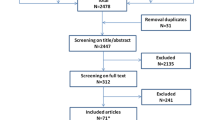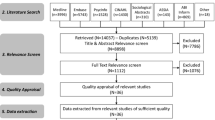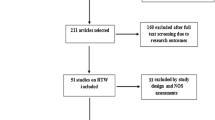Abstract
Purpose The objective of this study was to identify organizational factors that are predictive of return-to-work (RTW) among workers with musculoskeletal (MSD) and common mental disorders (CMD), and to subsequently catalogue and characterize the questionnaires (tools) used to measure them. Methods A systematic search on PubMed, Web of Science and PsycINFO library databases and grey literature was conducted. First, a list of organizational factors predictive of RTW for the two populations considered was built. Second, the questionnaires used to measure these factors were retrieved. Third, we looked in the scientific literature for studies on the psychometric properties and practical relevance of these questionnaires. Results Among the factors retained, perceived social support from supervisor and co-workers, work accommodations, and job strain were identified as common RTW factors. Other risk/protective factors, and associated tools, specifically targeting either people with MSD or CMD were also analysed. Conclusions Researchers and practitioners are often uncertain of which tools to use to measure organizational factors which can facilitate or hinder RTW. This study provides an evaluation of the tools measuring predictive organizational RTW factors in people with MSD and CMD. The identified tools can be used in everyday practice and/or research.
Similar content being viewed by others
References
Global Burden Disease. Global, regional, and national incidence, prevalence, and years lived with disability for 354 diseases and injuries for 195 countries and territories, 1990–2017: a systematic analysis for the Global Burden of Disease Study 2017 - The Lancet [Internet]. 2017 [cité 5 févr 2019].
Dewa CS, Loong D, Bonato S. Work outcomes of sickness absence related to mental disorders: a systematic literature review. BMJ Open. 2014;4:e005533.
Sultan-Taïeb H, Parent-Lamarche A, Gaillard A, Stock S, Nicolakakis N, Hong QN, et al. Economic evaluations of ergonomic interventions preventing work-related musculoskeletal disorders: a systematic review of organizational-level interventions. BMC Public Health. 2017;17:935.
Gragnano A, Negrini A, Miglioretti M, Corbière M. Common psychosocial factors predicting return to work after common mental disorders, cardiovascular diseases, and cancers: a review of reviews supporting a cross-disease approach. J Occup Rehabil. 2018;28(2):215–231.
Dionne CE, Bourbonnais R, Fremont P, Rossignol M, Stock SR, Laperriere E. Obstacles to and facilitators of return to work after work-disabling back pain: the workers’ perspective. J Occup Rehabil. 2013;23(2):280–289.
Gray H, Adefolarin AT, Howe TE. A systematic review of instruments for the assessment of work-related psychosocial factors (Blue Flags) in individuals with non-specific low back pain. Manual Theraphy. 2011;16:531–543.
Corbière M, Fraccaroli F. La conception, la validation, la traduction et l’adaptation transculturelle d’outils de mesure: exemples dans le domaine de la santé mentale (Conception, validation and transcultural adaptation of tools: examples in the filed of mental health). In: Corbière M, Larivière N, editors, Méthodes qualitatives, quantitatives et mixtes dans la recherche en sciences humaines, sociales et de la santé. Québec: Presses de l’Université du Québec; 2014. p. 577–620.
Lecomte T, Corbière M, Briand C. Psychosocial functioning assessment. In: Mueser KT, Jeste DV, editors. Clinical handbook of schizophrenia. Guilford: Press NY; 2008. p. 135–144.
Baltov P, Cote J, Truchon M, Feldman DE. Psychosocial and socio-demographic factors associated with outcomes for patients undergoing rehabilitation for chronic whiplash associated disorders: a pilot study. Disabil Rehabil. 2008;30(25):1947–1955.
Dionne CE, Bourbonnais R, Fremont P, Rossignol M, Stock SR, Nouwen A, et al. Determinants of « return to work in good health » among workers with back pain who consult in primary care settings: a 2-year prospective study. Eur Spine J. 2007;16(5):641–655.
Haveraaen LA, Skarpaas LS, Aas RW. Job demands and decision control predicted return to work: the rapid-RTW cohort study. BMC Public Health. 2017;17(1):154.
Haveraaen LA, Skarpaas LS, Berg JE, Aas RW. Do psychological job demands, decision control and social support predictreturn to work three months after a return-to-work (RTW) programme? The rapid-RTW cohort study. Work. 2016;53(1):61–71.
Heymans M, de Vet H, Knol D, Bongers P, Koes B, van Mechelen W. Workers’ beliefs and expectations affect return to work over 12 months. J Occup Rehabil. 2006;16(4):685–695.
Lindell O, Johansson S-E, Strender L-E. Predictors of stable return-to-work in non-acute, non-specific spinal pain: low total prior sick-listing, high self prediction and young age. A two-year prospective cohort study. BMC Family Pract. 2010;11:79–89.
Marhold C, Linton SJ, Melin L. Identification of obstacles for chronic pain patients to return to work: evaluation of a questionnaire. J Occup Rehabil. 2002;12(2):65–75.
Netterstrom B, Eller NH, Borritz M. Prognostic factors of returning to work after sick leave due to work-related common mental disorders: a one- and three-year follow-up study. BioMed Res Intl. 2015;2015:596572.
Opsahl J, Eriksen HR, Tveito TH. Do expectancies of return to work and Job satisfaction predict actual return to work in workers with long lasting LBP? BMC Musculoskelet Disord. 2016;17(1):481.
Soucy I, Truchon M, Côté D. Work-related factors contributing to chronic disability in low back pain. Work. 2006;26(3):313–326.
Vemer P, Bouwmans CA, Zijlstra-Vlasveld MC, van der Feltz-Cornelis CM, Hakkaart-van Roijen L. Let’s get back to work: survival analysis on the return-to-work after depression. Neuropsychiatr Dis Treat. 2013;9:1637–1645.
Karasek R, Brisson C, Kawakami N, Houtman I, Bongers P, Amick B. The Job Content Questionnaire (JCQ): an instrument for internationally comparative assessments of psychosocial job characteristics. J Occup Health Psychol. 1998;3(4):322–355.
Bigos SJ, Battié MC, Spengler DM, Fisher LD, Fordyce WE, Hansson TH, et al. A prospective study of work perceptions and psychosocial factors affecting the report of back injury. Spine. 1991;16(1):1–6.
Kristensen TS, Borritz M, Villadsen E, Christensen KB. The Copenhagen Burnout Inventory: a new tool for the assessment of burnout. Work Stress. 2005;19:192–207.
Anema J, Schellart A, Cassidy J, Loisel P, Veerman T, van der Beek A. Can cross country differences in return-to-work after chronic occupational back pain be explained? An exploratory analysis on disability policies in a six country cohort study. J Occup Rehabil. 2009;19(4):419–426.
Franche R, Severin C, Hogg-Johnson S, Côté P, Vidmar M, Lee H. The impact of early workplace-based return-to-work strategies on work absence duration: a 6-month longitudinal study following an occupational musculoskeletal injury. J Occup Environ Med. 2007;49(9):960–974.
Hogg-Johnson S, Cole D. Early prognostic factors for duration on temporary total benefits in the first year among workers with compensated occupational soft tissue injuries. Occup Environ Med. 2003;60(4):244–253.
Ekberg K, Wåhlin C, Persson J, Bernfort L, Öberg B. Early and late return to work after sick leave: predictors in a cohort of sick-listed individuals with common mental disorders. J Occup Rehabil. 2015;25(3):627–637.
Corbière M, Negrini A, Durand M-J, St-Arnaud L, Briand C, Fassier J-B, et al. Development of the Return-to-Work Obstacles and Self-Efficacy Scale (ROSES) and validation with workers suffering from a common mental disorder or musculoskeletal disorder. J Occup Rehabil. 2017;27(3):342.
Siegrist J, Starke D, Chandola T, Godin I, Marmot M, Niedhammer I, et al. The measurement of effort-reward imbalance at work: European comparisons. Soc Sci Med. 2004;58(8):1483–1499.
van der Weide W, Verbeek J, Sallé H, van Dijk F. Prognostic factors for chronic disability from acute low-back pain in occupational health care. Scand J Work Environ Health. 1999;25(1):50–56.
van Veldhoven M, Meijman T. Het meten van psychosociale arbeidsbelasting meteen vragenlijst. De Vragenlijst Beleving en Beoordeling van de Arbeid (VBBA) [Measuring psychosocial workload by means of a questionnaire. Questionnaire on the experience and evaluation of work]. Amsterdam: NIA; 1994.
Munir F, Burr H, Hansen JV, Rugulies R, Nielsen K. Do positive psychosocial work factors protect against 2-year incidence of long-term sickness absence among employees with and those without depressive symptoms? A prospective study. J Psychosom Res. 2011;70(1):3–9.
Norder G, Roelen C, van der Klink J, Bültmann U, Sluiter J, Nieuwenhuijsen K. External validation and update of a prediction rule for the duration of sickness absence due to common mental disorders. J Occup Rehabil. 2017;27:202–209.
Lemieux P, Durand MJ, Hong QN. Supervisors’ perception of the factors influencing the return to work of workers with common mental disorders. J Occup Rehabil. 2011;21(3):293–303.
Corbière M, Mazaniello-Chézol M, Bastien M-F, Wathieu E, Bouchard R, Panaccio A, Guay S, Lecomte T. Stakeholders’ role and actions in the return-to-work process of employees on sick-leave due to common mental disorders: a scoping review. J Occup Rehabil. 2019. https://doi.org/10.1007/s10926-019-09861-2.
Corbière M, Bergeron G, Negrini A, Coutu M-F, Samson E, Sauvé G, Lecomte T. Employee perceptions about factors influencing their return to work after a sick-leave due to depression. J Rehabil. 2018;84(3):3–13.
Durand M-J, Corbière M, Coutu M-F, Reinharz D, Albert V. A review of best work-absence management and return-to-work practices for workers with musculoskeletal or common mental disorders. Work. 2014;48(4):579–589.
Jetha A, LaMontagne AD, Lilley R, Hogg-Johnson S, Sim M, Smith P. Workplace social system and sustained return-to-work: a study of supervisor and co-worker supportiveness and injury reaction. J Occup Rehabil. 2018;28(3):486–494.
Chiaburu DS, Harrison DA. Do peers make the place? Conceptual synthesis and meta-analysis of coworker effects on perceptions, attitudes, OCBs, and performance. J Appl Psychol. 2008;93(5):1082–1103.
Dunstan DA, MacEachen E. Bearing the brunt: co-workers’ experiences of work reintegration processes. J Occup Rehabil. 2013;23(1):44–54.
Kosny A, Lifshen M, Pugliese D, Majesky G, Kramer D, Steenstra I, et al. Buddies in bad times? The role of co-workers after a work-related injury. J Occup Rehabil. 2013;23(3):438–449.
Main CJ, Burton AK. Economic and occupational influences on pain and disability. In: Main CJ, Spanswick CC, éditeurs. Pain management: an interdisciplinary approach [Internet]. Churchill Livingstone Publishers; 1999 [cité 5 févr 2019]. p. 63–88. Disponible sur: http://eprints.hud.ac.uk/id/eprint/7528/.
Netterstrøm B, Conrad N, Bech P, Fink P, Olsen O, Rugulies R, et al. The relation between work-related psychosocial factors and the development of depression. Epidemiol Rev. 2008;30(1):118–132.
Rugulies R, Bültmann U, Aust B, Burr H. Psychosocial work environment and incidence of severe depressive symptoms: prospective findings from a 5-year follow-up of the Danish Work Environment Cohort Study. Am J Epidemiol. 2006;163(10):877–887.
De Raeve L, Jansen NW, van den Brandt PA, Vasse RM, Kant Ij. Risk factors for interpersonal conflicts at work. Scand J Work Environ Health. 2008;34(2):96–106.
Janssen N, van den Heuvel WPM, Beurskens AJH, Nijhuis FJN, Schröer CAP, van Eijk JTM. The Demand-Control-Support model as a predictor of return to work. Int J Rehabil Res. 2003;26:1–9.
Nieuwenhuijsen K, Verbeek J, de Boer AGEM, Blonk R, van Dijk FJH. Supervisory behaviour as a predictor of return to work in employees absent from work due to mental health problems. Occup Environ Med. 2004;61(10):817–823.
Williams-Whitt K, Bültmann U, Amick B, Munir F, Tveito T, Anema J. Hopkinton Conference Working Group on Workplace. Disability Prevention Workplace interventions to prevent disability from both the scientific and practice perspectives: a comparison of scientific literature, grey literature and stakeholder observations. J Occup Rehabil. 2016;26(4):417–433.
Bastien M, Corbière M. Return-to-work following depression: what work accommodations do employers and human resources directors put in place? J Occup Rehabil. 2019;29(2):423–432.
Joyce S, Modini M, Christensen H, Mykletun A, Bryant R, Mitchell P, et al. Workplace interventions for common mental disorders: a systematic meta-review. Psychol Med. 2016;46(4):683–697.
Dewa CS, Trojanowski L, Joosen MC, Bonato S. Employer best practice guidelines for the return to work of workers on mental disorder-related disability leave: a systematic review. Can J Psychiatry. 2016;61(3):176–185.
Corbière M, Villotti P, Lecomte T, Bond GR, Lesage A, Goldner EM. Work accommodations and natural supports for maintaining employment. Psychiatric Rehabil J. 2014;37:90–98.
Karasek R, Theorell T. Healthy work: stress, productivity, and the reconstruction of working life. New York: Basic Books; 1990.
Kristensen T. Sickness absence and work strain among Danish slaughterhouse workers: an analysis of absence from work regarded as coping behaviour. Soc Sci Med. 1991;32(1):15–27.
Cropanzano R, Greenberg J. Progress in organizational justice: tunneling through the maze. In: Intl Rev Ind Org Psychol. New York: Wiley; 1997. p. 317–372.
Elovainio M, Kivimäki M, Steen N, Vahtera J. Job decision latitude, organizational justice and health: Multilevel covariance structure analysis. Soc Sci Med. 2004;58:1659–1669.
Head J, Kivimäki M, Siegrist J, Ferrie JE, Vahtera J, Shipley MJ, et al. Effort-reward imbalance and relational injustice at work predict sickness absence: the Whitehall II study. J Psychosom Res. 2007;63(4):433–440.
Hjarsbech PU, Christensen KB, Bjorner JB, Madsen IE, Thorsen SV, Carneiro IG, et al. A multi-wave study of organizational justice at work and long-term sickness absence among employees with depressive symptoms. Scand J Work Environ Health. 2014;40(2):176–185.
Kivimäki M, Elovainio M, Vahtera J, Ferrie JE. Organisational justice and health of employees: prospective cohort study. Occup Environ Med. 2003;60:27–33.
Ybema JF, van den Bos K. Effects of organizational justice on depressive symptoms and sickness absence: a longitudinal perspective. Soc Sci Med. 2010;70:1609–1617.
Robbins J, Ford M, Tetrick LE. Perceived unfairness and employee health: a meta-analytic integration. J Appl Psychol. 2012;97:235–272.
Kawachi I. Injustice at work and health: causation or correlation? Occup Environ Med. 2006;63(9):578–579.
Norlund S, Reuterwall C, Hoog J, Nordin M, Edlund C, Slunga Birgander L. Work related factors and sick leave after rehabilitation in burnout patients: experiences from the REST-project. J Occup Rehabil. 2011;21(1):23–30.
Siegrist J, Starke D, Chandola T, Godin I, Marmot M, Niedhammer I, et al. The measurement of effort-reward imbalance at work: European comparisons. Soc Sci Med. 2004;58(8):1483–1499.
White M, Wagner S, Schultz IZ, Murray E, Bradley SM, Hsu V, et al. Modifiable workplace risk factors contributing to workplace absence across health conditions: a stakeholder-centered best-evidence synthesis of systematic reviews. Work. 2013;45(4):1–12.
Janssen N, van den Heuvel W, Beurskens A, Nijhuis F, Schröer C, van Eik J. The demand-control-support model as a predictor of return to work. Int J Rehabil Res. 2003;26(1):1–9.
Soderberg M, Rosengren A, Gustavsson S, Schioler L, Harenstam A, Toren K. Psychosocial job conditions, fear avoidance beliefs and expected return to work following acute coronary syndrome: a cross-sectional study of fear-avoidance as a potential mediator. BMC Public Health. 2015;15:1263.
Lund T, Labriola M, Christensen KB, Bültmann U, Villadsen E, Burr H. Psychosocial work environment exposures as risk factors for long-term sickness absence among Danish employees: results from DWECS/DREAM. J Occup Environ Med. 2005;47(11):1141–1147.
Vahtera J, Kivimäki M, Pentti J, Theorell T. Effect of change in the psychosocial work environment on sickness absence: a seven year follow up of initially healthy employees. J Epidemiol Commun Health. 2000;54(7):484–493.
Nyberg A, Westerlund H, Magnusson Hanson LL, Theorell T. Managerial leadership is associated with self-reported sickness absence and sickness presenteeism among Swedish men and women. Scand J Public Health. 2008;36(8):803–811.
Krause N, Frank J, Dasinger L, Sullivan T, Sinclair S. Determinants of duration of disability and return-to-work after work-related injury and illness: challenges for future research. Am J Ind Med. 2001;40:464–484.
Johansson G, Lundberg O, Lundberg I. Return to work and adjustment latitude among employees on long-term sickness absence. J Occup Rehabil. 2006;16(2):185–195.
Huijs J, Koppes L, Taris T, Blonk R. Differences in predictors of return to work among long-term sick-listed employees with different self-reported reasons for sick leave. J Occup Rehabil. 2012;22:301–311.
Brendbekken R, Vaktskjold A, Harris A, Tangen T. Predictors of return-to-work in patients with chronic musculoskeletal pain: a randomized clinical trial. J Rehabil Med. 2018;50(2):193–199.
Schultz I, Crook J, Meloche G, Berkowitz J, Milner R, Zuberbier O, et al. Psychosocial factors predictive of occupational low back disability: towards development of a return-to-work model. Pain. 2004;107:77–85.
Vendrig A, Schaafsma F. Reliability and validity of the work and well-being inventory (WBI) for employees. J Occup Rehabil. 2018;28(2):377–390.
Bontoux L, Roquelaure Y, Billabert C, Dubus V, Sancho P, Colin D, et al. Prospective study of the outcome at one year of patients with chronic low back pain in a program of intensive functional restoration and ergonomic intervention. Factors predicting their return to work. Ann Readapt Med Phys. 2004;47(8):563–572.
van Duijn M, Lotters M, Burdof A. Influence of modified work on return to work for employees on sick leave due to musculoskeletal complaints. J Rehabil Med. 2005;37(3):172–179.
Stapelfeldt C, Christiansen D, Jensen O, Nielsen C, Petersen K, Jensen C. Subgroup analyses on return to work in sick-listed employees with low back pain in a randomised trial comparing brief and multidisciplinary intervention. BMC Musculoskelet Disord. 2011;12:112.
Nieuwenhuijsen K, Verbeek J, de Boer A, Blonk R, van Dijk F. Predicting the duration of sickness absence for patients with common mental disorders in occupational health care. Scand J Work Environ Health. 2006;32(1):67–74.
Munir F, Burr H, Hansen J, Rugulies R, Nielsen K. Do positive psychosocial work factors protect against 2-year incidence of long-term sickness absence among employees with and those without depressive symptoms? A prospective study. J Psychosom Res. 2011;70(1):3–9.
Katz J, Amick B, Keller R, Fossel A, Ossman J, Soucie V, et al. Determinants of work absence following surgery for carpal tunnel syndrome. Am J Ind Med. 2005;47(2):120–130.
Schultz I, Crook J, Berkowitz J, Meloche G, Milner R, Zuberbier O, et al. Biopsychosocial multivariate predictive model of occupational low back disability. Spine. 2002;27(23):2720–2725.
van der Giezen A, Bouter L, Nijhuis F. Prediction of return-to-work of low back pain patients sicklisted for 3–4 months. Pain. 2000;87(3):285–294.
Lammerts L, Schaafsma F, Eikelenboom M, Vermeulen S, van Mechelen W, Anema J, et al. Longitudinal associations between biopsychosocial factors and sustainable return to work of sick-listed workers with a depressive or anxiety disorder. J Occup Rehabil. 2016;26(1):70–79.
Moorman R. Relationship between organizational justice and organizational citizenship behaviors: do fairness perceptions influence employee citizenship? J Appl Psychol. 1991;76(6):845–855.
Acknowledgements
We acknowledge the valuable contributions of Maryse Gagnon (IRSST), Jean-Philippe Lachance (IUSMM), Julie Chabot, Annabelle Beauvais-St-Pierre, Scarlett Olivares-Fontaine and Marie-Andrée Richard to this study.
Funding
This study was supported by a grant from the Institut de recherche Robert-Sauvé en santé et sécurité du travail (Grant Number: 2014-0010).
Author information
Authors and Affiliations
Corresponding author
Ethics declarations
Conflict of interest
All authors declare that they have no conflict of interest.
Additional information
Publisher's Note
Springer Nature remains neutral with regard to jurisdictional claims in published maps and institutional affiliations.
Rights and permissions
About this article
Cite this article
Villotti, P., Gragnano, A., Larivière, C. et al. Tools Appraisal of Organizational Factors Associated with Return-to-Work in Workers on Sick Leave Due to Musculoskeletal and Common Mental Disorders: A Systematic Search and Review. J Occup Rehabil 31, 7–25 (2021). https://doi.org/10.1007/s10926-020-09902-1
Published:
Issue Date:
DOI: https://doi.org/10.1007/s10926-020-09902-1







